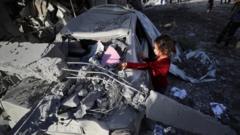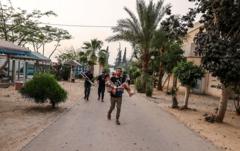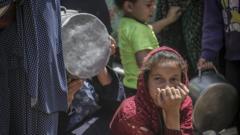The assassination attempt on Muhammad Sinwar, a major figure in Hamas, raises questions about its impact on the group's resilience and Israel's negotiation strategies. While his death could weaken Hamas temporarily, the potential for a more radical successor and the collective nature of Hamas's decision-making process complicate predictions regarding long-term changes.
The Impact of Muhammad Sinwar's Assassination on Hamas and Israeli Strategy

The Impact of Muhammad Sinwar's Assassination on Hamas and Israeli Strategy
Experts weigh in on the possible implications of the attempted assassination of Hamas leader Muhammad Sinwar on both the group’s structure and ongoing conflict dynamics.
The attempt on the life of Muhammad Sinwar, a prominent leader of Hamas, has sparked discussions regarding its implications for both the militant organization and Israel's tactical landscape. Should he be confirmed dead, it would signify a considerable gain for Israel in its ongoing campaign against Hamas leadership but leaves open-ended questions regarding the long-term effects on the group's cohesion and strategic outlook.
Sinwar has held a significant position in Hamas, known for his staunch military tactics. His assassination could destabilize the group's already fragmented hierarchy, especially following Israel's previous elimination of other key figures, including his brother Yahya Sinwar, who was pivotal in orchestrating attacks against Israel in 2023. Central to Israel's narrative is the belief that figures like Sinwar hinder progress toward a cease-fire, as he reportedly opposes any significant compromises that would involve the ceding of arms—a vital precondition cited by Israel for peace talks.
Political analysts suggest that even if Sinwar's death might momentarily weaken the faction, it is unlikely to shift the broader power dynamics or the group's collective decision-making process. The assertion is that Hamas is not solely reliant on any single leader; rather, it possesses a collective approach to governance and military strategy.
According to Mkhaimar Abusada, a political scientist from Gaza, Sinwar's removal could yield negative outcomes if his successor proves to be more hardline. As Abusada notes, Hamas’s leadership enjoys a degree of resilience despite the systematic targeting from Israeli forces. The organization has endured previous losses, highlighting a trend where leadership changes do not necessarily lead to softer stances regarding negotiations.
Thus, the question remains: While Israel may achieve a tactical victory, will this translate into a strategic advantage or pave the way for a more entrenched cycle of radicalization within Hamas? The complexities inherent in this conflict continue to challenge the narratives on both sides, emphasizing that any potential shifts will require more than just leadership alterations—it will necessitate a sustainable approach to conflict resolution that has eluded the region for decades.






















